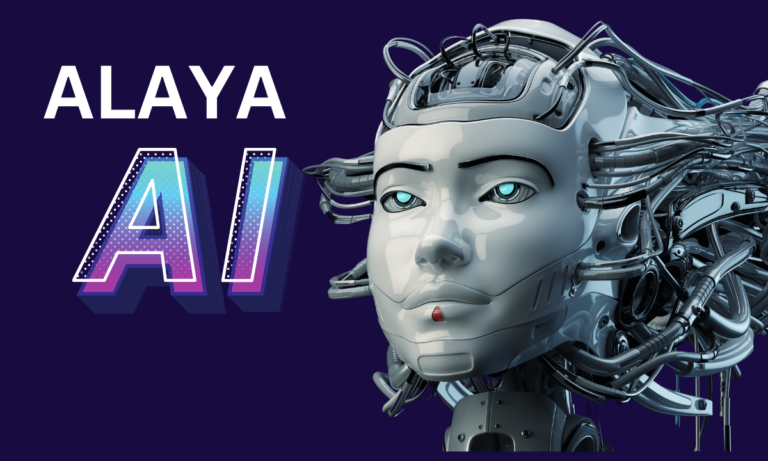The Role of Machine Learning in Alaya AI
Machine learning (ML) is a crucial part of Alaya AI, enabling it to learn from data and make smart decisions. This article will explore what machine learning is, how it works, and its various applications in Alaya AI. We will also discuss the tools that make machine learning effective in this context.
What is Machine Learning?
Machine learning is a branch of artificial intelligence (AI) that teaches computers to learn from data and improve over time without being explicitly programmed.
Imagine a computer as a student. it learns from examples, identifies patterns, and makes predictions based on the information it has.
Key Characteristics of Machine Learning:
- Learning from Data: ML algorithms use historical data to make predictions or decisions.
- Pattern Recognition: ML can identify trends and patterns in data that may not be obvious to humans.
- Adaptability: ML systems can adapt to new data, improving their performance over time.

How Machine Learning Works
1. Data Collection: The first step in machine learning is gathering data. This data can come from various sources, such as user interactions, transactions, and sensor readings.
2. Data Preparation: Once data is collected, it must be cleaned and organized. This process involves removing errors, filling in missing values, and transforming the data into a format machine learning algorithms can understand.
3. Choosing a Model: There are different types of machine learning models, including:
- Supervised Learning: The algorithm is trained on labeled data, meaning the desired output is known.
- Unsupervised Learning: The algorithm finds patterns in data without labeled outcomes.
- Reinforcement Learning: The algorithm learns by receiving feedback from its actions.
4. Training the Model: The chosen model is then trained using the prepared data. During training, the algorithm adjusts its parameters to minimize prediction errors.
5. Evaluation: After training, the model is tested usingnew data to see how well it performs. Metrics such as accuracy, precision, and recall help evaluate its effectiveness.
6. Deployment: Once the model performs well, it can be deployed to make predictions or decisions in real time.
Applications of Machine Learning in Alaya AI
Machine learning plays a vital role in Alaya AI, enabling it to provide intelligent solutions for various applications. Here are some key areas where machine learning is applied:
- Data Annotation: Alaya AI uses machine learning to automate the process of data labeling. This speeds up the data preparation phase and ensures high AI Tools for Machine Learning
- Several tools and frameworks facilitate machine learning, making it easier for developers to create and implement ML models. Some popular tools include:
- TensorFlow: An open-source library developed by Google for building and training ML models.
- Scikit-learn: A Python library that provides simple and efficient data mining and analysis tools.
- PyTorch: A flexible machine learning framework that allows developers to build complex models easily.
- Keras: A high-level API for building deep learning models, making it accessible for beginners.quality annotations for training AI models.
- Predictive Analytics: Machine learning models can predict future trends and behaviors by analyzing historical data. This is useful for businesses to make informed decisions based on expected outcomes.
- Personalization: Machine learning helps tailor user experiences by analyzing individual preferences and behaviors. For instance, it can recommend content or services that align with a user’s interests.
- Fraud Detection: In finance and e-commerce, machine learning algorithms can identify unusual patterns that may indicate fraudulent activities. This enhances security and trust in online transactions.
- Natural Language Processing (NLP): Machine learning is essential in understanding and processing human language. Alaya AI can analyze text data to extract insights, perform sentiment analysis, and improve customer interactions.
AI Tools for Machine Learning
Several tools and frameworks facilitate machine learning, making it easier for developers to create and implement ML models. Some popular tools include:
- TensorFlow: An open source library developed by Google for building and training ML models.
- Scikit-learn: A Python library that provides simple and efficient data mining and analysis tools.
- PyTorch: A flexible machine learning framework that allows developers to build complex models easily.
- Keras: A high level API for building deep learning models, making it accessible for beginners.
Ethical Considerations in Machine Learning
Machine learning in AI raises relevant ethical concerns that require proper attention. One major issue is the concern of bias in the algorithms, this can happen where the training data contains existing discrimination or disparities that would not be fair towards a certain group or groups.
Furthermore, the privacy of data is very crucial because sensitive data has the potential to be abused if proper care is not taken.
Making algorithms’ decision processes explicit is important to ensure accountability and thus encourage trust in AI-based technologies.
Tackling these ethical issues is important in the quest for ethically responsible AI development to achieve justice and protect the rights of individuals.
Machine Learning vs. Traditional Programming
Machine learning differs from traditional programming in how it approaches problem solving. In traditional programming, a developer writes explicit rules and instructions for the system to follow, meaning it only does what it’s programmed to do.
In contrast, machine learning allows the system to learn from data and improve without manual intervention. Instead of following predefined rules, ML models can detect patterns and make predictions based on experience.
This flexibility makes ML ideal for complex tasks in Alaya AI, such as personalization and data analytics, where manual coding would be inefficient or impossible.
Challenges in Implementing Machine Learning
Implementing machine learning comes with several challenges despite its many benefits. One key issue is data quality, if the data used to train the model is incomplete or inaccurate, the results will be unreliable.
Another challenge is choosing the right algorithm, as different tasks require different models, and picking the wrong one can lead to poor performance.
Resource requirements are also a concern, as machine learning often needs powerful hardware and significant processing time to train complex models.
Finally, ensuring the models are transparent and easy to explain is important for building trust, especially in sensitive areas like healthcare or finance.
The Future of Machine Learning in AI
The future of machine learning in AI is full of exciting possibilities. Emerging trends like deep learning and reinforcement learning are making AI smarter and more capable of handling complex tasks.
Technologies such as AI-powered automation and edge computing are also expected to play a big role, allowing faster and more efficient data processing directly on devices rather than relying on cloud servers.
For Alaya AI, this means better performance, faster decision making, and more personalized user experiences. As AI evolves, we’ll see even more advanced healthcare, finance, and everyday technology applications.
Case Studies: Successful Machine Learning Implementations
Alaya AI has successfully used machine learning in several real world applications. For example, it automates data annotation, reducing the time and effort needed to label large datasets for AI training.
In fraud detection, Alaya AI’s machine learning models can spot unusual transactions, improving business security.
Another case is predictive analytics, where Alaya AI helps companies forecast trends and make better decisions based on historical data.
These implementations show how machine learning can solve complex problems efficiently, offering valuable insights for future innovations.
The Role of Human Expertise in Machine Learning
Human expertise is crucial in machine learning, even though many tasks are automated. Experts must design the algorithms, ensuring the models work effectively for specific problems.
They also interpret the results, making sense of the data and fine-tuning the models for better accuracy. Additionally, humans make ethical decisions, ensuring that AI systems are fair and free from bias.
This balance between machine automation and human insight helps create reliable and responsible AI systems like those used in Alaya AI.
The Integration of Machine Learning with Other Technologies
Machine learning works well with other technologies like blockchain and distributed systems, making Alaya AI even more powerful.
Blockchain ensures secure and transparent data handling, crucial for machine learning models that rely on large datasets.
Distributed systems help process data faster by spreading tasks across multiple machines, improving efficiency and scalability.
By combining these technologies, Alaya AI can deliver smarter, faster, and more secure solutions, showcasing the flexibility and potential of machine learning in different industries.
Conclusion
Machine learning is a powerful technology that significantly enhances the capabilities of Alaya AI. Machine learning is at the forefront of AI innovation by enabling data driven decision making, automating processes, and improving user experiences. As technology continues to evolve, we can expect even more exciting applications.
FAQs






